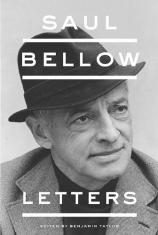Saul Bellow: Letters
Review
Saul Bellow: Letters
It’s impossible to read this collection of some 700 of Saul Bellow’s vast output of correspondence over more than 70 years without feeling a tinge of sadness. That's because our powerful and ubiquitous new modes of electronic communication make it almost certain we’ll never see volumes like this one from some of our most talented contemporary authors. Bellow’s deluge of commentary on the writing life, friendship, art, love, loss and the effort of one brilliant human being to navigate the choppy waters of a vibrant life almost makes us nostalgic in advance for what we’ll be missing.
Novelist and essayist Benjamin Taylor, the editor of this collection (he contributes a brief interpretive essay and a chronology that will be especially helpful to those not intimately familiar with Bellow’s work), does an effective job shifting the focus between the personal and professional in Bellow’s life. Alongside copious correspondence with the author’s Chicago childhood friends, extended letters to many of the major literary figures of the 20th century’s second half appear in these pages. Bellow had long and warm exchanges with Ralph Ellison (who lived for a time in a house Bellow owned in Tivoli, New York), Robert Penn Warren and John Berryman. There’s even one letter harshly critical of William Faulkner’s support for a pardon for the anti-Semite Ezra Pound (“If sane he should be tried again as a traitor; if insane he ought not to be released merely because he is a poet.”). His intense relationships with critics like Alfred Kazin and Lionel Trilling seemed to warm or cool based on the reception of his latest work. But in the end, he wrote in 1978 to his friend John Cheever, “There are no critics I could nominate for anything but crucifixion.”
Bellow’s graciousness and generosity to his fellow writers repeatedly surface in these letters. Perhaps because of his own at first unsuccessful efforts to secure a Guggenheim Foundation grant, once he became a fellow, Bellow actively promoted the applications of writers like Grace Paley (“an excellent writer, fresh, original, independent, clear in her aims”) and Bernard Malamud (“I think his merits will be no less plain to the gentlemen of the committee than they are to me.”). He was also a keen judge of rising literary stars, first corresponding with Philip Roth in 1957 (Roth was 24), and later nominating him for a Nobel Prize (“His books have been so widely examined and praised that it would be superfluous for me to describe, or praise, his gifts.”) and developing a warm friendship with Martin Amis that carried through to the end of his life.
It was not until his mid-40s that Bellow attained anything resembling financial security (he supplemented his writing income with an array of teaching positions at elite institutions throughout his life), and concerns about money surface frequently in his correspondence. And even after capturing the Nobel and Pulitzer Prizes in 1976, he complained to Wright Morris that his stories had been “rejected by the Atlantic, Esquire and others.” But with all the acclaim showered on him after the publication of THE ADVENTURES OF AUGIE MARCH and HERZOG, Bellow understood he ultimately would be judged on the quality of his literary craftsmanship. In a 1956 letter to critic Granville Hicks, he wrote:
“[T]here is only one way to defeat the enemy, and that is to write as well as one can. The best argument is an undeniably good book. If that doesn’t convince ’em, and it may not for the spirit of denial is very strong, one has at least labored to some purpose in having reached less arbitrary and opinionated souls who have not yet learned of the lamentable obsolescence of fiction.”
Bellow’s prodigious literary talent perhaps was matched only by the disaster that was his personal life. Married five times and father of a child at age 84, in 1977 he was sentenced to prison for contempt by a judge who concluded he had concealed assets from his third wife in their divorce settlement (he never served time). His observation in the midst of that legal battle that his “experience with courts and lawyers leaves no room for optimism” is hardly surprising. A decade later, he complains that “a new group of lawyers is gnawing at my foundations.”
It’s the unguarded quality of these letters, in which Bellow lays himself bare far more than in any conventional autobiography that makes this volume so engaging. Bellow’s singular voice --- energetic, passionate, often querulous --- gushes from every page. Inevitably, that persona shares the stage with someone who had at least one eye firmly fixed on his literary legacy. And while a few of the more personal letters might have benefitted from some judicious pruning, they’re quickly supplanted by more substantial fare.
Saul Bellow had the benefit of a long life (he died in 2005 just two months short of his 90th birthday) and the blessing of good health that allowed him to remain vigorous and productive well into his 80s. Anyone with even a passing interest in the history of American literature in the second half of the 20th century will find rich rewards in these letters.
Reviewed by Harvey Freedenberg (mwn52@aol.com) on November 4, 2010
Saul Bellow: Letters
- Publication Date: November 4, 2010
- Genres: Nonfiction
- Hardcover: 608 pages
- Publisher: Viking Adult
- ISBN-10: 0670022217
- ISBN-13: 9780670022212





